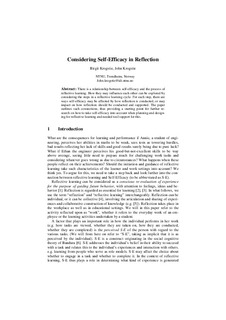| dc.contributor.author | Krogstie, Birgit Rognebakke | |
| dc.contributor.author | Krogstie, John | |
| dc.date.accessioned | 2017-01-13T12:39:48Z | |
| dc.date.available | 2017-01-13T12:39:48Z | |
| dc.date.created | 2016-09-17T14:05:16Z | |
| dc.date.issued | 2016 | |
| dc.identifier.issn | 1613-0073 | |
| dc.identifier.uri | http://hdl.handle.net/11250/2427251 | |
| dc.description.abstract | There is a relationship between self-efficacy and the process of reflective learning. How they may influence each other can be explored by considering the steps in a reflective learning cycle. For each step, there are ways self-efficacy may be affected by how reflection is conducted, or may impact on how reflection should be conducted and supported. The paper outlines such connections, thus providing a starting point for further research on how to take self-efficacy into account when planning and designing for reflective learning and needed tool support for this. | |
| dc.language.iso | eng | nb_NO |
| dc.publisher | CEUR-WS.org | nb_NO |
| dc.title | Considering Self-Efficacy in Reflection. Proceedings of ARTEL 2016 | nb_NO |
| dc.type | Journal article | nb_NO |
| dc.type | Peer reviewed | nb_NO |
| dc.description.version | acceptedVersion | |
| dc.source.journal | CEUR Workshop Proceedings | nb_NO |
| dc.identifier.cristin | 1382294 | |
| cristin.unitcode | 194,68,20,80 | |
| cristin.unitcode | 194,63,10,0 | |
| cristin.unitname | Institutt for informatikk og e-læring | |
| cristin.unitname | Institutt for datateknikk og informasjonsvitenskap | |
| cristin.ispublished | true | |
| cristin.fulltext | postprint | |
| cristin.qualitycode | 1 | |
